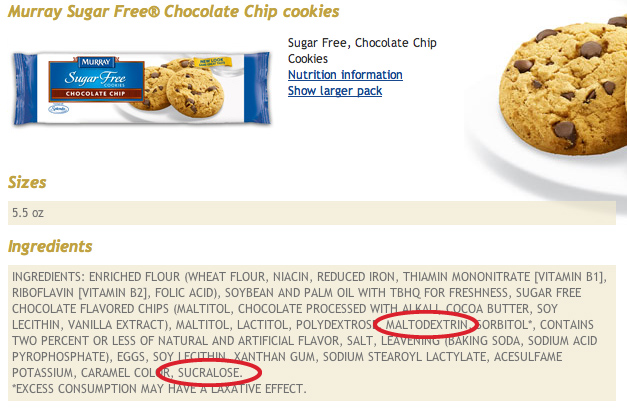Beware of Hidden Sugars
I’m sure you’ve seen those packages that parade the “no added sugar” but did you know that most of those claims are not entirely true? It may mean that they didn’t add (table) sugar, but it does not mean that they did not add an artificial or a chemical sugars. It is important to become familiar with the list of sugars so you can determine if a product is safe to consume.
 Artificial sweeteners may be the most well known for their low-glycemic properties and are largely used in commercialized products.There is a lot of controversy surrounding artificial sweeteners and the safety of long-term ingesting. Artificial sweeteners tend to have an unwanted aftertaste after ingested, and like Sugar Alcohol based sweeteners , they too have a laxative effect if eaten in large quantities.
Artificial sweeteners may be the most well known for their low-glycemic properties and are largely used in commercialized products.There is a lot of controversy surrounding artificial sweeteners and the safety of long-term ingesting. Artificial sweeteners tend to have an unwanted aftertaste after ingested, and like Sugar Alcohol based sweeteners , they too have a laxative effect if eaten in large quantities.
The following is a list of artificial / chemical sweeteners. Besides the fact that they are very harmful to our bodies, studies have shown that they do not help with weight loss. Our bodies do not know what to do with these artificial ingredients and so the brain sends a signal to send the components to the liver. And there it sits. And sits. Our liver is our main fat-burning organ so it’s really important to keep it clean.
Aspartame – Also known as Equal or NutraSweet, has been linked to numerous health issues including, but not limited to, headaches, mood swings, neurological disorders, seizures and even brain tumors. This harmful ingredient breaks down into phenylalanine when it is ingested and metabolized. Phenylalanine causes excessive action of neurons in the brain and it kills cells. Aspertame turns to formaldehyde at 80 degrees, which obviously is a lower temperature than our bodies. Research has shown that too much phenylalanine can trigger Attention Deficit Disorder, Hyperactive Disorder, as well as emotional and behavioral disorders.
Splenda / Sucralose is made with chlorine components. The presence of chlorine is thought to be the most dangerous component of sucralose. Chlorine is considered a carcinogen and has been used in poisonous gas, disinfectants, pesticides, and plastics.
Short-term studies done by Splenda’s manufacturers, McNeil Nutritionals, revealed that test rodents suffered from dangerous side effects such as shrunken thymus glands, and enlarged livers and kidneys. No long-term studies were done before Splenda was approved by the FDA.Read more on Splenda here.
Saccharin – Also known as Sweet ‘n Low. Although not solidly proven, this sweetener has been thought to cause cancer. It has been found to cause bladder cancer in lab animals. It now comes with a cancer-warning label. Reported reactions include wheezing, nausea, diarrhea, tongue blisters, tachycardia, fixed eruptions, headache, diuresis, and sensory neuropathy.
Maltodextrin – It is produced from rice, potato or corn starch. It is known to contain MSG and it doesn’t need to state that on the ingredient label. It is also known to affect blood sugar levels and cause tooth decay. You will find this additive in sugar packets as well as in sugar free jello, crystal light …
Dextrose – A GMO (Gentically Modified Organism) ingredient made from plant starch (Usually corn starch).
Sweet One – the latest and not greatest artificial sweetener, is made from vinegar and is very similar to saccharin. No studies have been done and reported at the time of this post. Please don’t join in on the artificial bandwagon and become a horrible statistic.
Fructose listed on packages are a bit more tricky and you need to understand the manufacturing process of the product before making a decision whether or not to purchase and consume. For some products, fructose refers to the chemical name fructose while others use a natural fructose – one that occurs naturally in fruits and honey. Naturally produced fructose and chemical fructose are not the same thing. The fructose you see listed on most ingredient labels of processed foods is not derived naturally from fruit or honey. This fructose is often extracted corn syrup. In the processing stage the sucrose molecule breaks down into two simple sugars- fructose and glucose. This makes this type of fructose more processed than white sugar and a very unhealthy choice. Fructose on ‘all natural’ products are healthy to consume (in moderation) as this type of fructose is derived naturally from fruit.
Image source: Murray Sugar Free Cookies


